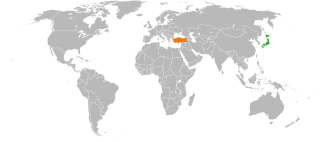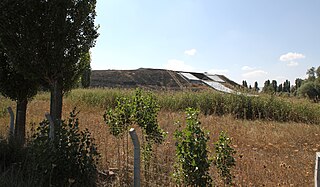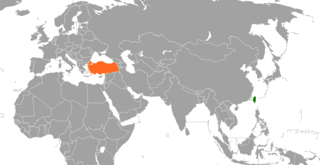This article needs additional citations for verification .(February 2021) |
The Turkish Ambassador to Japan is the official representative of the President of Turkey and the Government of Turkey to the Emperor of Japan and Government of Japan. [1]
This article needs additional citations for verification .(February 2021) |
The Turkish Ambassador to Japan is the official representative of the President of Turkey and the Government of Turkey to the Emperor of Japan and Government of Japan. [1]
| Ambassador | Term Start | Term End |
|---|---|---|
| Hulusi Fuat Tugay | 7 July 1925 | 25 March 1929 |
| Cevad Ezine | 7 April 1929 | 26 November 1931 |
| Nebil Batı | 17 December 1931 | 13 February 1936 |
| Hüsrev Gerede | 22 December 1936 | 19 June 1939 |
| Ferid Tek | 5 December 1939 | 13 July 1943 |
| Ali Muzaffer Göker | 10 September 1944 | 6 January 1945 |
| İzzet Aksalur | 27 November 1952 | 1 July 1955 |
| Semih Baran | 2 July 1955 | 29 May 1957 |
| Süreyya Anderiman | 30 May 1957 | 28 September 1959 |
| Kemal Nejad Kavur | 26 April 1960 | 21 September 1962 |
| Melih Esenbel | 25 September 1963 | 2 December 1966 |
| Turgut Aytuğ | 6 January 1967 | 29 January 1970 |
| Şükrü Elekdağ | 30 November 1970 | 23 August 1974 |
| Celal Eyiceoğlu | 31 October 1974 | 17 August 1979 |
| Nazif Cuhruk | 14 December 1979 | 23 September 1983 |
| Nurver Nureş | 1 October 1983 | 19 January 1987 |
| Umut Arık | 1 February 1987 | 17 December 1991 |
| Necati Utkan | 1 January 1992 | 23 October 1996 |
| Gündüz Aktan | 27 October 1996 | 19 May 1998 |
| Yaman Başkurt | 1 December 1998 | 25 December 2002 |
| Solmaz Ünaydın | 3 February 2003 | 26 January 2007 |
| Selim Sermet Atacanlı | 5 April 2007 | 3 April 2011 |
| Abdurrahman Bilgiç | 10 June 2011 | 22 October 2011 |
| Serdar Kılıç | 4 July 2012 | 2 April 2014 |
| Ahmet Bülent Meriç | 16 April 2014 | 15 November 2017 |
| Hasan Murat Mercan | 17 November 2017 | 28 February 2021 |
| Korkut Güngen | 15 March 2021 | Present |

Cyprus, officially the Republic of Cyprus, is an island country located in the eastern Mediterranean Sea, north of the Sinai Peninsula, south of the Anatolian Peninsula, and west of the Levant. It is geographically a part of West Asia, but its cultural ties and geopolitics are overwhelmingly Southeast European. Cyprus is the third-largest and third-most populous island in the Mediterranean. It is located east of Greece, north of Egypt, south of Turkey, and west of Lebanon and Syria. Its capital and largest city is Nicosia. The northeast portion of the island is de facto governed by the self-declared Turkish Republic of Northern Cyprus.

The Turkish Armed Forces are the military forces of the Republic of Turkey. The Turkish Armed Forces consist of the General Staff, the Land Forces, the Naval Forces and the Air Forces. The Chief of the General Staff is the Commander of the Armed Forces. In wartime, the Chief of the General Staff acts as the Commander-in-Chief on behalf of the President, who represents the Supreme Military Command of the TAF on behalf of the Grand National Assembly of Turkey. Coordinating the military relations of the TAF with other NATO member states and friendly states is the responsibility of the General Staff.
A puppet state, puppet régime, puppet government or dummy government is a state that is de jure independent but de facto completely dependent upon an outside power and subject to its orders. Puppet states have nominal sovereignty, except that a foreign power effectively exercises control through economic or military support. By leaving a local government in existence the outside power evades all responsibility, while at the same time successfully paralyzing the local government they tolerate.

The Turkish Radio and Television Corporation is the national public broadcaster of Turkey, founded in 1964. TRT was for many years the only television and radio provider in Turkey. Before the introduction of commercial radio in 1990, and subsequently commercial television in 1992, it held a monopoly on broadcasting. More recent deregulation of the Turkish television broadcasting market produced analogue cable television. Today, TRT broadcasts around the world, especially in Europe, Middle East, Africa, Asia, USA, and Australia.
In history, religion and political science, a purge is a position removal or execution of people who are considered undesirable by those in power from a government, another organization, their team leaders, or society as a whole. A group undertaking such an effort is labeled as purging itself. Purges can be either nonviolent or violent, with the former often resolved by the simple removal of those who have been purged from office, and the latter often resolved by the imprisonment, exile, or murder of those who have been purged.

The Western Bloc is an informal, collective term for countries that were officially allied with the United States during the Cold War of 1947–1991. While the NATO member states, in Western Europe and Northern America, were pivotal to the bloc, it included many other countries, in the broader Asia-Pacific region, the Middle East, Latin America, and Africa with histories of anti-Soviet, anti-communist and, in some cases anti-socialist, ideologies and policies. As such, the bloc was opposed to the political systems and foreign policies of communist countries, which were centered on the Soviet Union, other members of the Warsaw Pact, and usually the People's Republic of China. The name "Western Bloc" emerged in response to and as the antithesis of its Communist counterpart, the Eastern Bloc. Throughout the Cold War, the governments and the Western media were more inclined to refer to themselves as the "Free World" or the "First World", whereas the Eastern bloc was often referred to as the "Communist World" or less commonly the "Second World".

Mustafa Kemal Atatürk, also known as Mustafa Kemal Pasha until 1921, and Ghazi Mustafa Kemal from 1921 until the Surname Law of 1934, was a Turkish field marshal, revolutionary statesman, author, and the founding father of the Republic of Turkey, serving as its first president from 1923 until his death in 1938. He undertook sweeping progressive reforms, which modernized Turkey into a secular, industrializing nation. Ideologically a secularist and nationalist, his policies and socio-political theories became known as Kemalism.

Pan-Asianism is an ideology aimed at creating a political and economic unity among Asian peoples. Various theories and movements of Pan-Asianism have been proposed, particularly from East, South and Southeast Asia. The motive for the movement was in opposition to the values of Western imperialism and colonialism, and that Asian values were superior to European values.

This is a gallery of international and national flags used in Asia.

The neutral powers were countries that remained neutral during World War II. Some of these countries had large colonies abroad or had great economic power. Spain had just been through its civil war, which ended on 1 April 1939 —a war that involved several countries that subsequently participated in World War II.

Turkey, officially the Republic of Türkiye, is a country mainly on the Anatolian Peninsula in West Asia, with a smaller part called East Thrace on the Balkan Peninsula in Southeast Europe. It borders the Black Sea to the north; Georgia to the northeast; Armenia, Azerbaijan, and Iran to the east; Iraq to the southeast; Syria and the Mediterranean Sea to the south; the Aegean Sea to the west; and Greece and Bulgaria to the northwest. Cyprus is off the south coast. Most of the country's citizens are ethnic Turks, while Kurds are the largest ethnic minority. Ankara is Turkey's capital and second-largest city, while Istanbul is its largest city and economic and financial centre, as well as the largest city in Europe.
Atmea was a joint venture between Mitsubishi Heavy Industries (MHI) and EDF Group set up in 2006 to develop, market, license and sell the ATMEA1 reactor, a new generation III+, medium-power pressurized water reactor (PWR). The company was headquartered in Paris. The joint venture was abandoned in 2019.

The October 2007 clashes in Hakkari were a series of clashes between the Kurdistan Workers' Party and the Turkish Armed Forces.

Japan–Turkey relations are foreign relations between Japan and Turkey. Japan has an embassy in Ankara and a consulate-general in Istanbul. Turkey has an embassy in Tokyo and a consulate-general in Nagoya. The relationship has been described as "close".

Mevlüt Çavuşoğlu is a Turkish diplomat and politician who is currently a member of the Grand National Assembly. He also served as the Minister of Foreign Affairs of Turkey from August 2014 to August 2015, and again from 24 November 2015 to 6 June 2023.

Kaman-Kalehöyük is a multi-period archaeological site in Kırşehir Province, Turkey, around 100 km south east of Ankara, 6 km east of the town center of Kaman. It is a tell or mound site that was occupied during the Bronze Age, Iron Age and Ottoman periods. Excavations in the mound have been carried out since 1986 under the direction of Sachihiro Omura, on behalf of the Middle Eastern Culture Center in Japan and the Japanese Anatolian Archeology Institute. The distance to Hattusa, the Hittite capital, is about 100 km.

The Framework Agreement on the Bangsamoro is a preliminary peace agreement signed in the Malacañan Palace in Manila, Philippines on October 15, 2012. The agreement calls for the creation of an autonomous political entity named Bangsamoro, replacing the Autonomous Region in Muslim Mindanao (ARMM) which was described by Former President Benigno Aquino III as "a failed experiment".
The Sinop Nuclear Power Plant is a proposed nuclear plant in Turkey located at Sinop on the Black Sea. Talks with China, Russia and South Korea are ongoing in 2023. If constructed, it will be the country's second nuclear power plant after Akkuyu Nuclear Power Plant.
Kırşehir Museum is a museum in Kırşehir, Turkey. The museum is on Ahi Evran street in Kırşehir.

Taiwan–Turkey relations are the foreign relations between Taiwan and Turkey. Since 1971, Turkey maintains non-governmental, working-level relations with Taiwan.